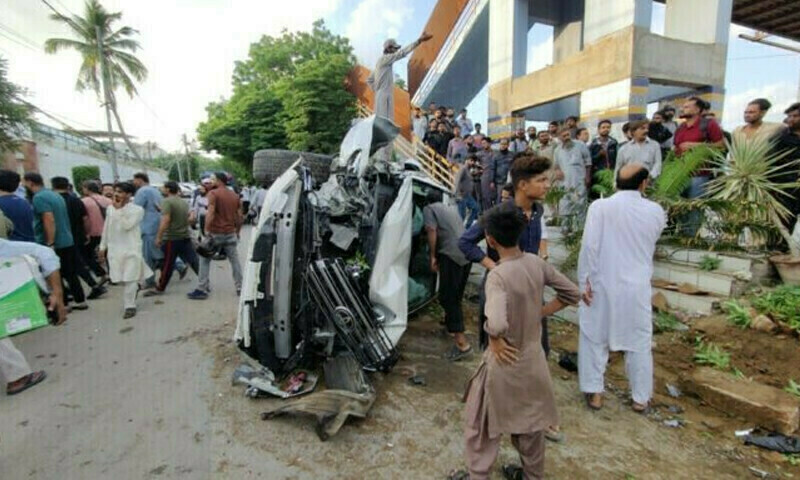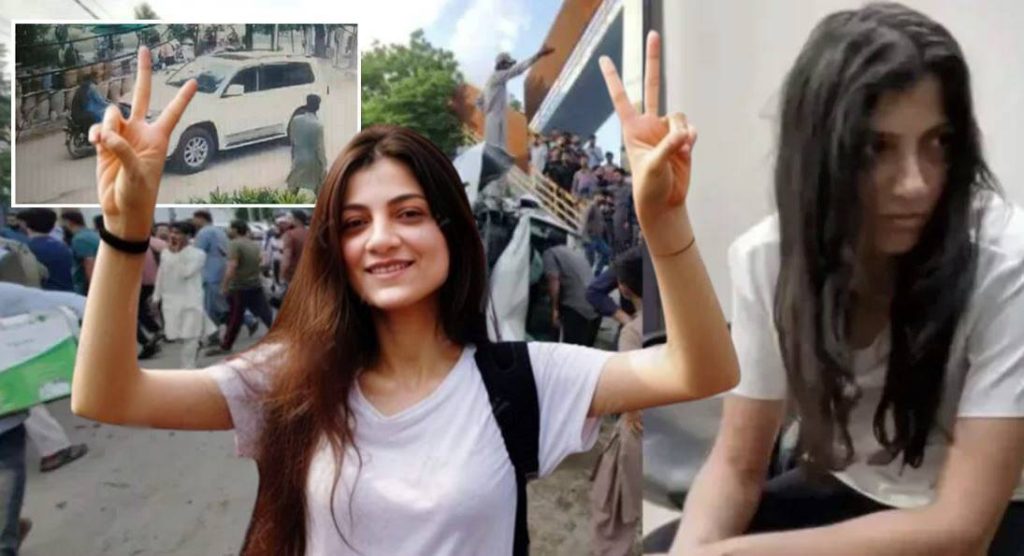In a surprising turn of events, the Karsaz accident case, which involved the tragic
deaths of Imran Arif and his young daughter Amina, has reached an out-of-court
settlement. The suspect, Natasha Iqbal, who was behind the wheel during the fateful
incident, has been forgiven by the victims’ family, sparking debates and raising
eyebrows across the community. While the settlement brings an end to a legal battle
that had captured public attention, questions linger about the true nature of justice and
the motives behind this unexpected act of forgiveness.
The Tragic Accident on Karsaz Road

On a seemingly ordinary day in Karachi, tragedy struck on Karsaz Road when Natasha
Iqbal, a young woman from a well-to-do family, crashed her car into another vehicle,
killing Imran Arif and his daughter Amina on the spot. The accident was both
devastating and shocking, especially given its suddenness and the loss of innocent
lives. Eyewitnesses reported that Natasha appeared erratic and unstable at the scene,
leading to speculation about her state of mind.
Natasha was soon arrested, and the case gained widespread attention in the media,
becoming a focal point for discussions about road safety, reckless driving, and the
responsibilities of those behind the wheel. From the outset, Natasha’s defense team
claimed that she was suffering from severe mental health issues, a claim that many
viewed as a convenient excuse to evade accountability for the deaths caused by her
reckless driving.
While the defense repeatedly highlighted Natasha’s alleged mental health issues, many
questioned the legitimacy of these claims. Critics argued that presenting mental health
as a justification for her actions was not only problematic but also an attempt to garner
sympathy and reduce the legal consequences of her actions. Some viewed it as a
deliberate strategy to shift the narrative away from the core issue of her negligence on
the road.
Public opinion on the matter was divided. Some sympathized with Natasha, seeing her
as a victim of unfortunate circumstances, while others believed that the mental health
argument was a smokescreen designed to escape justice. Regardless, the case
continued to unfold in court, with both sides presenting their arguments and evidence.
Karsaz Accident Case: The Out-of-Court Settlement

After several months of hearings, the case took an unexpected turn when news broke
that an out-of-court settlement had been reached between Natasha Iqbal and the
victims’ family. The settlement, reportedly involving a significant monetary
compensation, came as a surprise to many who had been following the case closely.
The Arif family’s decision to forgive Natasha, thereby closing the case without further
legal proceedings, was met with mixed reactions. On one hand, it was seen as a
magnanimous act, a gesture that allowed the family to find peace and closure. On the
other, it raised questions about whether justice had been served and whether such a
resolution was influenced by factors beyond compassion, such as societal pressure or
financial incentives.
Public Reaction and Debate
The news of the settlement quickly spread, igniting a wave of discussions across social
media and news platforms. Some applauded the Arif family for choosing forgiveness
over retribution, suggesting that their decision was rooted in compassion and a desire to
move forward from the tragedy. Others, however, criticized the outcome, arguing that it
set a dangerous precedent where justice could be bought or negotiated outside the
courtrooms.
The issue of Natasha’s mental health, or the perceived convenient excuse of it, was
also a hot topic of debate. Many wondered whether the settlement indicated an implicit
acknowledgment of Natasha’s claim, or if the family had simply decided to avoid a
prolonged and painful legal battle.
A Staggering Offer: 5.5 Billion Rupees for Forgiveness
In a surprising move that underscored the gravity of the situation, Natasha Iqbal’s family
offered a staggering sum of 5.5 billion rupees to Imran Arif’s family as part of the
out-of-court settlement. This substantial financial compensation was presented not only
as an acknowledgment of the immense loss suffered by the victims’ family but also as a
gesture of sincere remorse and a desire to seek forgiveness, reflecting the complexities
surrounding Natasha’s mental health condition and the tragic accident on Karsaz Road.
The Role of Wealth and Influence
The case also brought to light the broader issue of how wealth and social status can
influence the course of justice in society. Natasha, coming from a privileged
background, was able to secure a legal team that aggressively pursued the mental
health defense, a tactic that might not be available to those with fewer resources.
Critics argued that the out-of-court settlement was less about forgiveness and more
about the financial power wielded by Natasha’s family. In a society where legal
outcomes can often be swayed by money and connections, this case became a symbol
of the deep-rooted inequities within the justice system.
A Complex Decision for the Victims’ Family
While the public continues to debate the morality and fairness of the settlement, it is
essential to consider the Arif family’s perspective. Losing a loved one, especially in such
a sudden and violent manner, is a trauma that words cannot capture. For Imran Arif’s
widow and their remaining family members, every day since the accident has likely
been a struggle between grief and the desire for justice.
Choosing to forgive Natasha, whether influenced by financial compensation, personal
beliefs, or the exhaustion of a drawn-out legal process, might have been their way to
seek peace and healing in a situation filled with pain and loss. For them, the settlement
could represent a step toward rebuilding their lives, even if the decision has sparked
controversy in the public eye.
The Implications for Justice and Accountability
This case highlights a critical issue within the justice system: the balance between legal
accountability and personal reconciliation. While out-of-court settlements are not
uncommon, especially in cases involving personal injury or loss, the Natasha Iqbal case
has underscored the complexities involved when such settlements intersect with public
opinion and societal norms.
By accepting the settlement and choosing to forgive, the Arif family has concluded their
pursuit of justice in a manner that reflects their values and priorities. However, the
broader implications for society remain. Will this case encourage other families to seek
similar resolutions, or will it prompt a more significant debate on the limits of such
settlements in matters involving serious crimes?
Conclusion: A Case That Will Not Be Forgotten
The Karsaz accident case may have reached an end with the out-of-court settlement,
but the discussions it has sparked will likely continue for some time. The decision to
forgive Natasha Iqbal has raised critical questions about justice, accountability, and the
role of personal choice in the legal system. Whether seen as an act of compassion or a
compromise shaped by circumstance, the settlement has left an indelible mark on all
those involved and will continue to be a point of reflection for society at large.
While the family of Imran Arif and Amina has chosen a path forward, the debate over
the fairness of the outcome and the implications of using mental health as a defense will
persist. For many, this case will be remembered not just for the tragedy on Karsaz
Road, but for the unexpected turn that brought it to a close.







